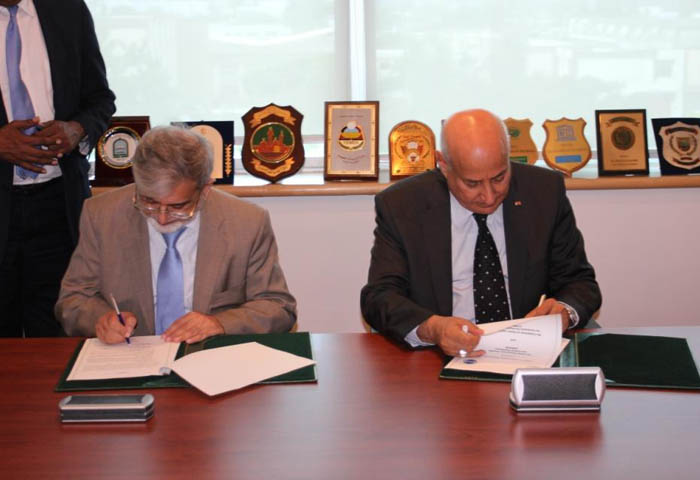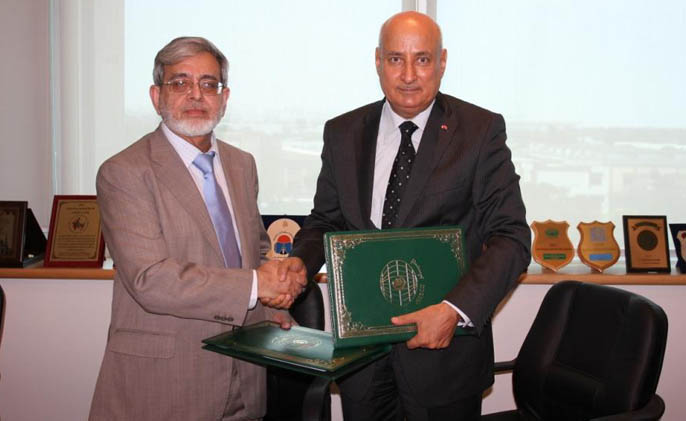A two-member delegation of COMSATS comprising Executive Director, Dr. I. E. Qureshi, and Advisor (Programmes), Mr. Tajammul Hussain paid a visit to ISESCO Headquarters in Rabat, Morocco, on 15th July 2015, to conclude a cooperation agreement between the two organizations for the biennium 2016-17. The delegation was received by the Director-General ISESCO, H. E. Dr. Abdulaziz Othman Altwaijri, at his office in Rabat. Also present on the occasion were: Dr. Amina Obaid Ramadhan Alhajri, Deputy Director-General ISESCO, and Dr. Mustapha Ahmed Ali, Supervisor Directorate of External Relations and Cooperation (ISESCO).
Dr. Qureshi briefed the Director-General about the meetings of COMSATS’ delegation held earlier during the day with Acting Director (Science) ISESCO, Ms. Aicha Bamoune, and former Director ISESCO Center for Promotion of Scientific Research (ICPSR), Ms. Wafaa El-Alami, in connection with the upcoming joint activities of COMSATS and ISESECO during the year 2015. He also informed the Director-General about a consultative meeting held between the delegation and the Honourable Deputy Director-General, in which all aspects of future cooperation had been discussed at length. The Director-General expressed his satisfaction with respect to the ongoing joint programmes, and complete confidence in COMSATS with respect to the execution of future joint activities during the next two years. He intimated that the proposals from COMSATS are discussed with him personally and he finds no hesitation in approving them, because of their high intrinsic value and excellent track record of COMSATS as an efficient and reliable partner. Among other things discussed between the two Heads of organizations was the general state of science funding in Member States and the benefits of pooling R&D resources from among developing countries.
earlier during the day with Acting Director (Science) ISESCO, Ms. Aicha Bamoune, and former Director ISESCO Center for Promotion of Scientific Research (ICPSR), Ms. Wafaa El-Alami, in connection with the upcoming joint activities of COMSATS and ISESECO during the year 2015. He also informed the Director-General about a consultative meeting held between the delegation and the Honourable Deputy Director-General, in which all aspects of future cooperation had been discussed at length. The Director-General expressed his satisfaction with respect to the ongoing joint programmes, and complete confidence in COMSATS with respect to the execution of future joint activities during the next two years. He intimated that the proposals from COMSATS are discussed with him personally and he finds no hesitation in approving them, because of their high intrinsic value and excellent track record of COMSATS as an efficient and reliable partner. Among other things discussed between the two Heads of organizations was the general state of science funding in Member States and the benefits of pooling R&D resources from among developing countries.
Later on, Director-General ISESCO led the guests to a meeting room, wh ere senior officials of various Divisions and Sections of ISESCO were present to witness the signing ceremony. In his opening remarks, Director-General ISESCO appreciated the visit of COMSATS’ delegation and expressed strong commitment to continue the collaboration with COMSATS to undertake a variety of capacity-building events in common Member States. On the basis of the past experience, he regarded the cooperation with COMSATS as ‘exemplary partnership’. Dr. Qureshi, in his remarks, returned the compliments by recalling that COMSATS’ joint activities with ISESCO have been highly appreciated by its Member States. There has been a major expansion of the common programmes with the decision by ISESCO to support COMSATS’ International Thematic Research Groups (ITRGs).
ere senior officials of various Divisions and Sections of ISESCO were present to witness the signing ceremony. In his opening remarks, Director-General ISESCO appreciated the visit of COMSATS’ delegation and expressed strong commitment to continue the collaboration with COMSATS to undertake a variety of capacity-building events in common Member States. On the basis of the past experience, he regarded the cooperation with COMSATS as ‘exemplary partnership’. Dr. Qureshi, in his remarks, returned the compliments by recalling that COMSATS’ joint activities with ISESCO have been highly appreciated by its Member States. There has been a major expansion of the common programmes with the decision by ISESCO to support COMSATS’ International Thematic Research Groups (ITRGs).
The documents signed by Dr. Qureshi and Dr. Altwaijri, on behalf of their respective organizations envisage 17 different activities during the next two years. Some of these activities are continuation of the already implemented serial workshops related to repair and maintenance of scientific equipment, and Internet security training, as well as those on Science, Technology and Innovation policies. Other symposia and meetings relate to the nanotechnology, ICTs, and biotechnologies. Support to ITRGs on Mathematical Modeling, Agriculture and Biotechnology is also included in the future joint programmes.
Commenting on Morocco’s accession to COMSATS, the Director-General congratulated COMSATS and expressed hope that, as the host country of ISESCO, Morocco would now be fully benefitting from future events organized jointly by COMSATS and ISESCO. In this regard, it was agreed that the upcoming meeting in Rabat on the uses of ICTs in Health, Agriculture and Education, will have substantial participation of Moroccan research workers.
The signing of the agreement and the meetings held in ISESCO Headquarters are expected to further strengthen the cooperative ties and mutual trust between the two organizations.







